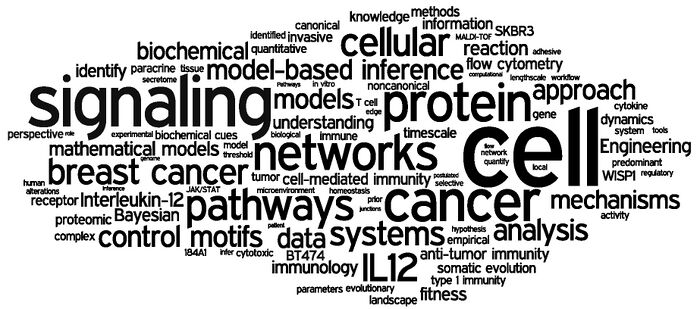Klinke
The Klinke Lab @ West Virginia University
Home
Research
Lab Members
Publications
Talks
Positions
Contact
Dr. David J. Klinke II is a Professor in the Department of Chemical and Biomedical Engineering in the Benjamin M. Statler College of Engineering and Mineral Resources (CEMR) at WVU. In addition to his position in Chemical and Biomedical Engineering, he is a Member of the WVU Cancer Institute and an Adjunct Associate Professor of Microbiology, Immunology, and Cell Biology in the WVU School of Medicine. He received his Ph.D. in Chemical Engineering from Northwestern University in 1998, where his research focus was on developing rule-based models of complicated chemical reaction networks. From 1999 until joining WVU in 2006, he developed large-scale mathematical models of immunologic and metabolic diseases for one of the commercial pioneers in the emerging field of systems pharmacology: Entelos, Inc. His current research integrates ideas drawn from probability, statistics, high performance computing, and chemical kinetics with high-content experimental assays and proteomic methods to address outstanding problems in cancer immunology and cellular signal transduction. A visual representation of the recent publications from the lab are shown below.

In short, the Klinke lab applies existing technology or prototypes new technology to identify how biological networks are regulated in health and how these networks become altered in cancer.
This isn't your parent's chemical engineering.
Here at West Virginia University, Prof. Klinke’s research program builds on his experience developing large-scale mathematical models of human pathophysiology. Building mathematical models of disease is a collaborative effort between engineers and life scientists to extract information from the scientific literature to define, calibrate, and validate these models experimentally. Understanding biology via computational modeling and targeted experimentation is very similar to traditional research in chemical and biomedical engineering. At the most basic level, chemical and biomedical engineering are fields in which basic science data is integrated into computational frameworks. Traditionally, chemical engineering integrates basic chemistry data into computational models to develop new chemical products or processes. These models are used to make predictions. Predictions, as a quantitative representation of our knowledge, are used to confirm our knowledge of a system or identify area where our understanding may be inaccurate. Identifying shortcomings in our knowledge is an essential part of how people learn. Moving forward into the 21st Century, there is an urgent need for integrating basic biology data into computational frameworks to understand disease pathophysiology and aid in the rational design of novel therapeutics. Engineering better medicines is one of the Grand Challenges in Engineering, which highlight the evolving role of engineering in society. It is our goal to become leaders in the fields of chemical and biomedical engineering by fulfilling this urgent need.
Interdisciplinary research is an essential component of a contemporary engineering education. Our research involves both the Department of Chemical and Biomedical Engineering in the Statler College of Engineering and Mineral Resources and Department of Microbiology, Immunology & Cell Biology in the School of Medicine at West Virginia University. The wet lab is located on the Health Sciences campus while the computational lab is located on the Evansdale campus. The Evansdale campus is less than one mile west of the Health Sciences campus and connected by the Personal Rapid Transit system that provides free transportation between the two campuses.
